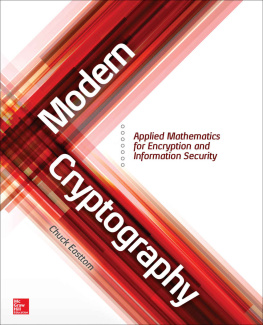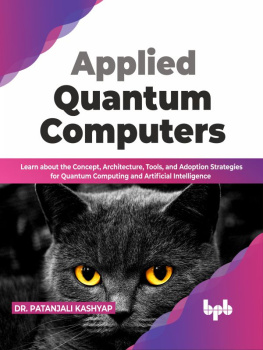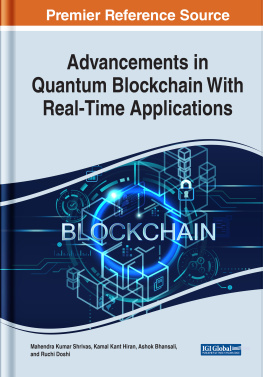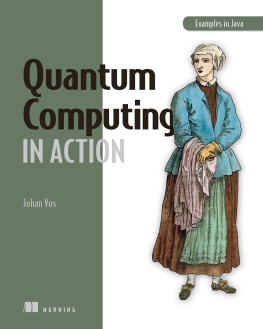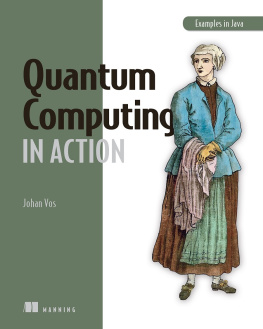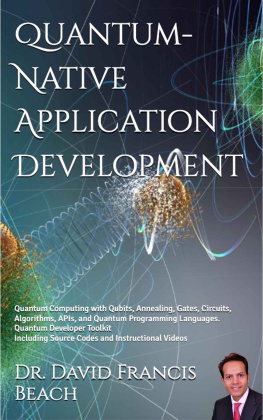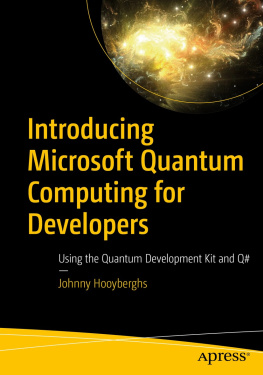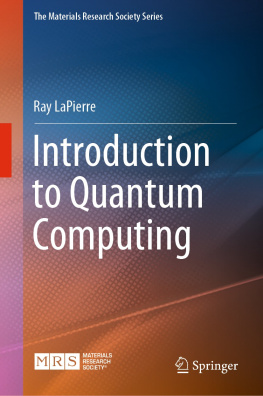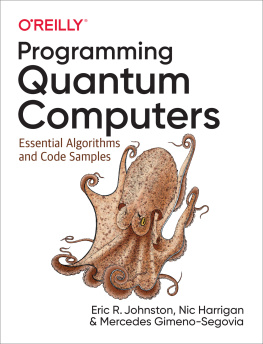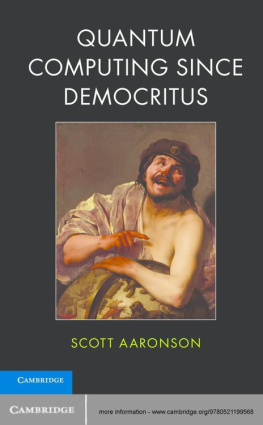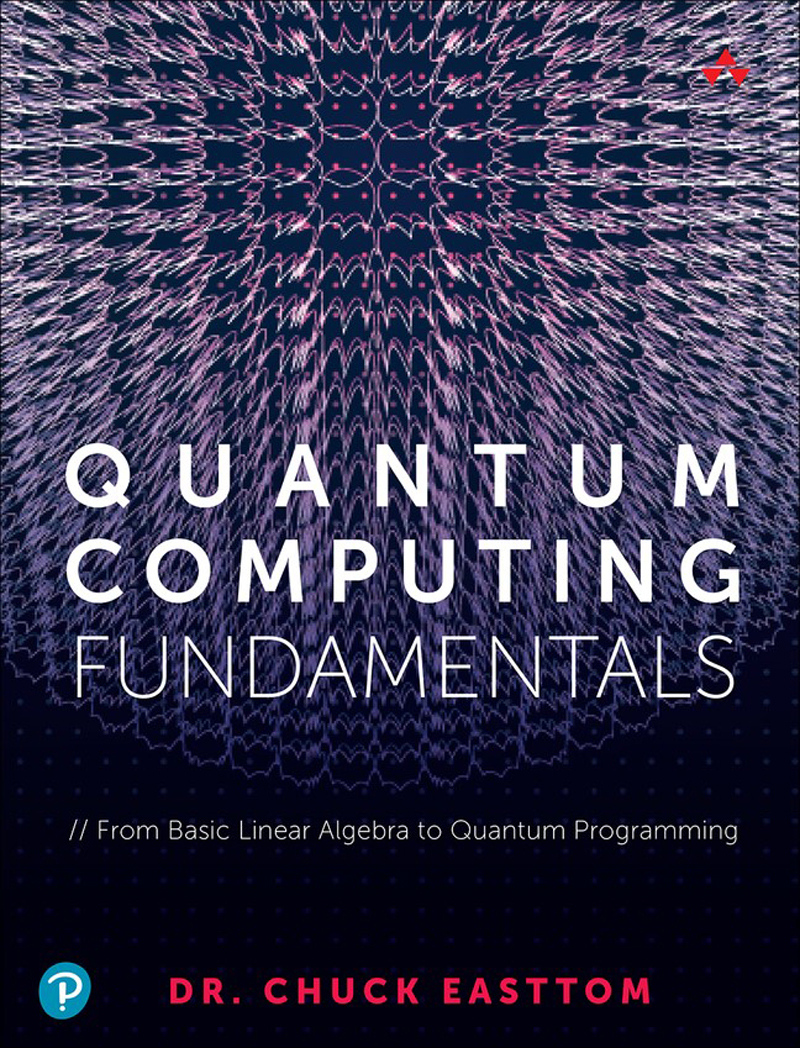Quantum Computing Fundamentals
Chuck Easttom II

Boston Columbus New York San Francisco Amsterdam Cape Town
Dubai London Madrid Milan Munich Paris Montreal Toronto Delhi Mexico City
So Paulo Sydney Hong Kong Seoul Singapore Taipei Tokyo
Many of the designations used by manufacturers and sellers to distinguish their products are claimed as trademarks. Where those designations appear in this book, and the publisher was aware of a trademark claim, the designations have been printed with initial capital letters or in all capitals.
The author and publisher have taken care in the preparation of this book, but make no expressed or implied warranty of any kind and assume no responsibility for errors or omissions. No liability is assumed for incidental or consequential damages in connection with or arising out of the use of the information or programs contained herein.
For information about buying this title in bulk quantities, or for special sales opportunities (which may include electronic versions; custom cover designs; and content particular to your business, training goals, marketing focus, or branding interests), please contact our corporate sales department at or (800) 382-3419.
For government sales inquiries, please contact .
For questions about sales outside the U.S., please contact .
Visit us on the Web: informit.com/aw
Library of Congress Control Number: 2021903471
Copyright 2021 Pearson Education, Inc.
All rights reserved. Printed in the United States of America. This publication is protected by copyright, and permission must be obtained from the publisher prior to any prohibited reproduction, storage in a retrieval system, or transmission in any form or by any means, electronic, mechanical, photocopying, recording, or likewise. For information regarding permissions, request forms and the appropriate contacts within the Pearson Education Global Rights & Permissions Department, please visit www.pearsoned.com/permissions/.
ISBN-13: 978-0-13-679381-6
ISBN-10: 0-13-679381-9
ScoutAutomatedPrintCode
Editor-in-Chief
Mark Taub
Director, ITP Product Manager
Brett Bartow
Executive Acquisitions Editor
James Manly
Development Editor
Christopher A. Cleveland
Managing Editor
Sandra Schroeder
Project Editor
Mandie Frank
Copy Editor
Bart Reed
Indexer
Proofreader
Technical Reviewers
Izzat Alsmadi, Renita Murimi
Editorial Assistant
Cindy Teeters
Designer
Chuti Prasertsith
Compositor
codeMantra
Dedication
As always, I dedicate my work to my wonderful wife Teresa. A quote from my favorite movie is how I usually thank her: What truly is logic? Who decides reason? My quest has taken me to the physical, the metaphysical, the delusional, and back. I have made the most important discovery of my careerthe most important discovery of my life. It is only in the mysterious equations of love that any logic or reasons can be found. I am only here tonight because of you. You are the only reason I am. You are all my reasons.
Preface
Writing a book is always a challenging project. But with a topic like quantum computing, it is much more so. If you cover too much, the reader will be overwhelmed and will not gain much from the book. If you cover too little, you will gloss over critical details. With quantum computing, particularly a book written for the novice, it is important to provide enough information without overwhelming. It is my sincere hope that I have accomplished this.
Clearly some readers will have a more robust mathematical background than others. Some of you will probably have some experience in quantum computing; however, for those of you lacking some element in your background, don't be concerned. The book is designed to give you enough information to proceed forward. Now this means that every single chapter could be much larger and go much deeper. In fact, I cannot really think of a single chapter that could not be a separate book!
When you are reading a section that is a new concept to you, particularly one you struggle with, don't be concerned. This is common with difficult topics. And if you are not familiar with linear algebra, , will start right off with new concepts for youconcepts that some find challenging. I often tell students to not be too hard on themselves. When you are struggling with a concept and you see someone else (perhaps the professor, or in this case the author) seem to have an easy mastery of the topic, it is easy to get discouraged. You might think you are not suited for this field. If you were, would you not understand it as readily as others? The secret that no one tells you is that all of those others, the ones who are now experts, struggled in the beginning, too. Your struggle is entirely natural. Don't be concerned. You might have to read some sections more than once. You might even finish the book with a solid general understanding, but with some fuzziness on specific details. That is not something to be concerned about. This is a difficult topic.
For those readers with a robust mathematical and/or physics background, you are likely to find some point where you feel I covered something too deeply, or not deeply enough. And you might be correct. It is quite difficult when writing a book on a topic such as this, for a novice audience, to find the proper level at which to cover a given topic. I trust you won't be too harsh in your judgement should you disagree with the level at which I cover a topic.
Most importantly, this book should be the beginning of an exciting journey for you. This is the cutting edge of computer science. Whether you have a strong background and easily master the topics in this book (and perhaps knew some already) or you struggle with every page, the end result is the same. You will be open to a bold, new world. You will see the essentials of quantum mechanics, understand the quantum computing revolution, and perhaps even be introduced to some new mathematics. So please don't get too bogged down in the struggle to master concepts. Remember to relish the journey!
Register your copy of Quantum Computing Fundamentals on the InformIT site for convenient access to updates and/or corrections as they become available. To start the registration process, go to informit.com/register and log in or create an account. Enter the product ISBN (9780136793816) and click Submit. Look on the Registered Products tab for an Access Bonus Content link next to this product, and follow that link to access any available bonus materials. If you would like to be notified of exclusive offers on new editions and updates, please check the box to receive email from us.
Acknowledgments
There are so many people who made this book possible. Let me start with Professor Izzat Alsmadi (Texas A&MSan Antonio) and Professor Renita Murimi (University of Dallas) were gracious enough to provide technical review of each and every chapter. Chris Cleveland was the lead editor, and I must confess, I am not the easiest person to edit. His patience and careful eye for detail were essential to this book. I also want to thank Bart Read for his work in copy editing. All the people working on this book have done an extremely good job helping me create a book that can be clear and accurate for the reader to learn this challenging topic.
About the Author


